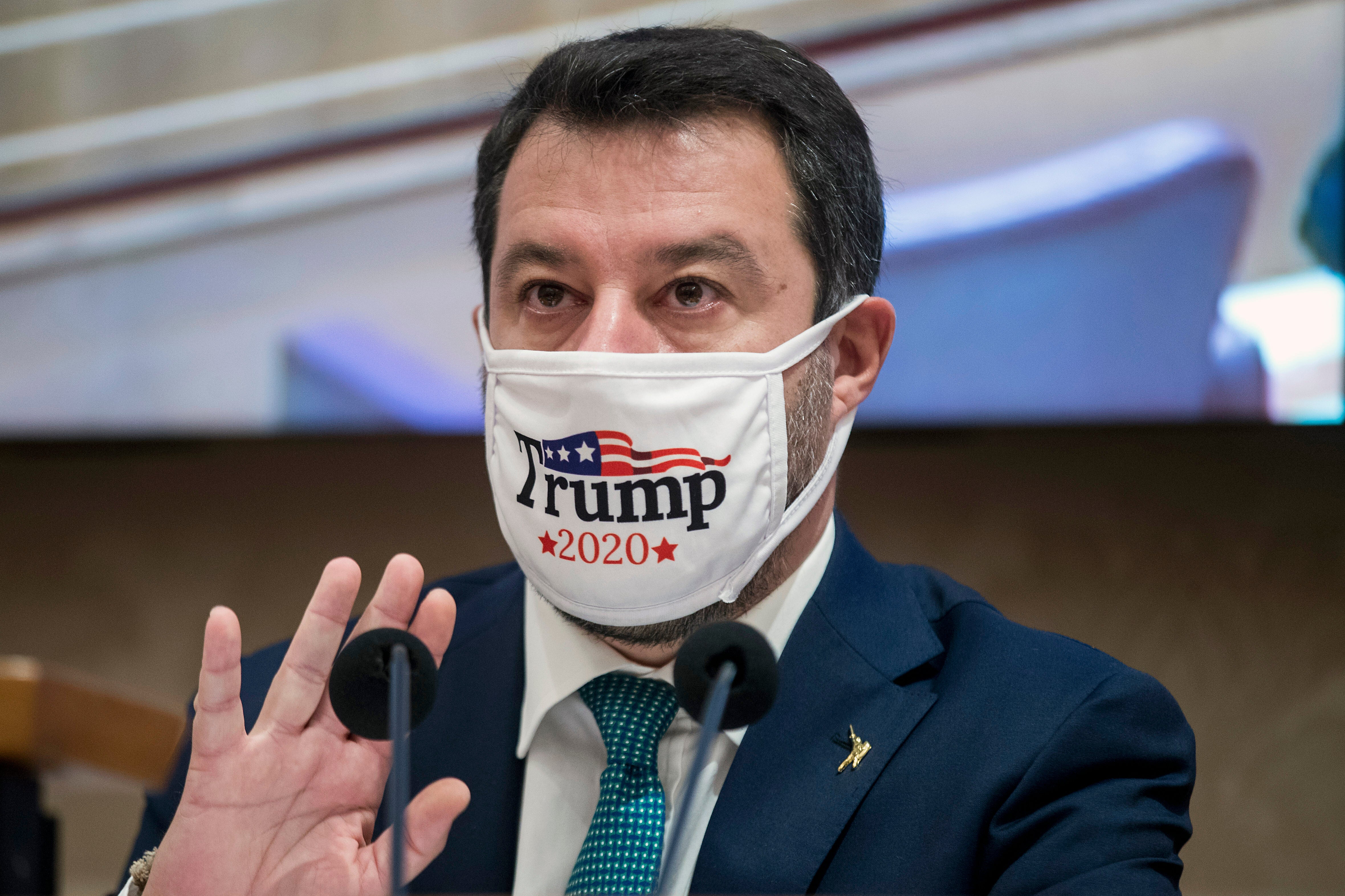Decline in support for Matteo Salvini is not the end of the far right in Italy – something more worrying is brewing
Giorgia Meloni, leader of the nationalist Brothers of Italy and Salvini’s coalition ally, has seen support for her party make up for the Northern League’s losses


Your support helps us to tell the story
From reproductive rights to climate change to Big Tech, The Independent is on the ground when the story is developing. Whether it's investigating the financials of Elon Musk's pro-Trump PAC or producing our latest documentary, 'The A Word', which shines a light on the American women fighting for reproductive rights, we know how important it is to parse out the facts from the messaging.
At such a critical moment in US history, we need reporters on the ground. Your donation allows us to keep sending journalists to speak to both sides of the story.
The Independent is trusted by Americans across the entire political spectrum. And unlike many other quality news outlets, we choose not to lock Americans out of our reporting and analysis with paywalls. We believe quality journalism should be available to everyone, paid for by those who can afford it.
Your support makes all the difference.This year has seen almost everything we know affected by unprecedented change, and Italian politics is no exception.
Former deputy prime minister Matteo Salvini, leader of the populist Northern League, has seen public support for his party tumble just as rapidly as it once rose. Polling at 39 per cent at its peak after the 2019 European parliament elections, and still within the thirties at the start of this year, the Northern League is down to 23-24 per cent in the latest polls.
While this may signal a shift in the League’s fortunes, it by no means signals the death of Italy’s far right. Giorgia Meloni, leader of the nationalist Brothers of Italy and Salvini’s coalition ally, has seen support for her party make up for the League’s losses, quadrupling since the last general election in 2018 and with no sign of stopping, thus rendering her Italy’s new – and in the view of some, most dangerous – breakout political star.
The world of politics is notoriously mercurial, especially in a country with a history of governmental instability such as Italy. As such, Salvini’s “downfall” should not be taken as absolute, nor does it herald the end of his road to Palazzo Chigi. After all, the League still remains Italy’s top party in the polls, and the centre-right coalition to which it belongs would appear to have well above the 40 per cent threshold needed to obtain a working majority.
However, there is no denying that the former deputy prime minister, who scored a spectacular own-goal by pulling the plug on the Northern League-Five Star Movement coalition government last summer, is politically weakened. Long gone are Salvini’s glory days, which saw him labelled as the “new face of Europe” on the cover of Time magazine.
His reaction to the Covid-19 pandemic and overall behaviour of late have been characterised as tactless and incoherent, marked by gimmicky protests and various faux pas, which included him flaunting social distancing rules to take selfies and eating cherries at a press conference while League colleague and Veneto’s regional president, Luca Zaia, talked about infant deaths.
In a country that has suffered steep human and economic costs this year, such a heavy-handed approach has clearly failed to strike a chord with the Italian public, contributing to the feeling that the “script” of Salvini’s political career has “jumped the shark”. Indeed, if current trends are to continue, there’s a good chance the League could be edged out of the top spot by the time of the 2023 general election.
What may seem like a promising forecast for Italy’s anti-populist forces, however, is offset by the rise of Meloni, a politician who is arguably just as, if not more, hard right than Salvini. The Brothers of Italy, the national-conservative party she leads, emerged from being a relatively minor political force, which only achieved 4.4 per cent in the March 2018 general election and 6.4 per cent in the 2019 European parliament elections, to becoming the country’s third party, polling at around 16-17 per cent.
Whether she could effectively nab Salvini’s leading role within the centre-right coalition and manage to become prime minister is still far from certain, but what’s clear is that she’s a force to be reckoned with, and her rise is not to be underestimated.
Meloni’s background lies firmly in the Italian far-right, post-fascist tradition. While Salvini was seeking TV fame and rallying with Che Guevara-toting communists as a young man in the 1990s, Meloni was a youth activist for the Italian Social Movement – the heir of the National Fascist Party – whose founder, former Nazi collaborator Giorgio Almirante, she praised earlier this year as a “patriot” and a “great man”. Her party, formed in 2012, is a descendant of the Movement, which was dissolved 25 years ago, and even maintains its tricolour flame logo.
It’s her reputation for consistency and reliability that has earned Meloni such great public approval in a year of deep uncertainty. Her response to the pandemic has been perceived as more “institutional” and serious than Salvini’s, bolstered by her long political experience, and she now ranks as Italy’s fourth-most popular politician. In such times of emergency, often met by a widespread quest for stirring patriotism, her nationalist message is ultimately more credible than Salvini’s – after all, despite his rebranding of the Northern League as an “Italians first” movement, it’s hard to shake off the party’s secessionist past.
Throughout her career, Meloni has made attempts to present herself as a palatable conservative, differing from Salvini’s brash image. Following the collapse of Italy’s traditional parties in the 1990s, Italian nationalists distanced themselves from their fascist roots, something Meloni herself continues to do.
Fascism, for her, is merely a “period in [Italy’s] history”, one with which she claims to have a “peaceful relationship”, although Meloni has distanced her party from Benito Mussolini’s racial laws. But her decidedly reactionary positions on a variety of issues are certainly a far cry from those anywhere close to the political centre-ground.
“My name is Giorgia. I am a woman, I am a mother, I am Italian, I am Christian – you won’t take this away from me,” she shouted from a public stage in Rome last year, in a tirade against the influence of LGBTQ+ rights movements – a speech that ended up being remixed into an unlikely club hit.
As much as Meloni may occasionally present herself as a mainstream politician, she staunchly belongs to the radical fringe. She and Salvini share relatively similar views on immigration and the rise of so-called “leftist” globalism, yet she has an even more hardline stance on social and ethical issues, especially on LGBTQ+ and reproductive rights. Defending the “natural family” and fighting “gender ideology”, for instance, are among the key messages of Brothers of Italy, and Meloni spoke at a “Family Day” rally back at a time when Salvini was refusing to attend.
Ultimately, Salvini is Italy’s most agile chameleon, a man whose notorious flip-flopping on political issues has made him the source of memes. Meloni, on the other hand, is the head of a party that has a long historical tie with Italy’s darkest period, and remains a committed member of Italy’s right-wing tradition. “I am the right. I am the history of the Italian right,” she proclaimed in a talk show this January. “Salvini’s history is something else.”
This is what I fear most about Meloni. The very “coherence” of her political stance, which makes her appealing to so many, is the thing that renders her possible ascension to power all the more worrisome to me. Italy is a country that has never fully managed to confront its fascist past.
With Salvini, at least, you know you’re getting a careerist whose political views are a reflection of whatever tactic can provide him the greatest public support. With Meloni, on the other hand, you’re getting a far-right conviction politician who, I fear, risks reopening the door to a past that Italy should have firmly buried.
Andrea Carlo is a British-Italian freelance journalist, commentator and PhD candidate researching Euroscepticism




Join our commenting forum
Join thought-provoking conversations, follow other Independent readers and see their replies
Comments